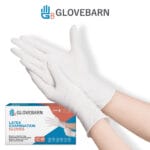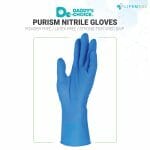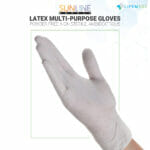When your hands are your primary tools of trade, protecting them becomes paramount. More than anyone, healthcare professionals understand the necessity of maintaining hygiene while ensuring personal safety. This is where nitrile gloves come into play, offering a reliable barrier between your skin and potential irritants. Let’s explore why nitrile gloves have become indispensable in healthcare settings, especially for those with sensitive skin. You’ll learn about their composition, benefits, and how they compare to other glove types, ensuring you make informed choices for your practice.
Understanding Nitrile Gloves and Their Importance
Nitrile gloves are crafted from synthetic rubber, making them a popular choice for those with latex allergies. Unlike latex or vinyl, nitrile offers superior puncture resistance, which is crucial when dealing with sharp medical instruments. This durability doesn’t compromise sensitivity, allowing healthcare workers to perform delicate tasks precisely.
Nitrile gloves provide added peace of mind for individuals with sensitive skin. Their hypoallergenic nature minimizes the risk of allergic reactions, a common concern with latex gloves. Additionally, nitrile gloves resist chemicals and pathogens, offering robust protection in various medical scenarios. This makes them ideal for healthcare professionals who encounter diverse environments daily.
The global demand for nitrile gloves has surged, driven by their effectiveness in medical settings and beyond. Whether you’re a nurse, doctor, or lab technician, understanding the advantages of nitrile gloves can enhance your safety and efficiency in the workplace.
The Composition of Nitrile Gloves
Nitrile gloves are made from acrylonitrile-butadiene rubber, a synthetic compound that offers flexibility and strength. This material is known for its resistance to oils, chemicals, and acids, making it a versatile choice for medical professionals who handle various substances. The manufacturing process involves polymerization, which enhances the durability and elasticity of the gloves.
Healthcare professionals often prefer nitrile gloves for their tactile sensitivity. Despite being thicker than latex, these gloves allow for precise movements, which is essential in procedures requiring dexterity. The texture and fit of nitrile gloves contribute to their popularity, providing comfort without compromising protection.
It’s important to note that nitrile gloves come in different thickness levels, catering to various needs. From lightweight options for general examinations to thicker variants for surgical procedures, nitrile gloves offer versatility to meet diverse demands in healthcare settings.
Advantages of Nitrile Over Latex Gloves
Latex gloves have been a staple in healthcare for decades, but nitrile gloves offer distinct advantages. One of the primary benefits is the reduced risk of latex allergies. With increasing numbers of healthcare workers developing sensitivities to latex, nitrile gloves provide a safe alternative without compromising protection.
Another advantage is the chemical resistance nitrile gloves offer. Unlike latex, which can degrade when exposed to certain substances, nitrile maintains its integrity. This is particularly important in medical environments where exposure to chemicals is daily. The resilience of nitrile gloves ensures consistent protection against potential hazards.
Furthermore, nitrile gloves are more puncture-resistant than latex. This additional layer of safety reduces the risk of cross-contamination and infection, making them a preferred choice for many healthcare professionals. Combining these factors positions nitrile gloves as a superior option in medical settings.
Addressing Sensitive Skin Concerns
Many healthcare professionals have sensitive skin. Nitrile gloves address this issue by being free from allergens commonly found in latex gloves. This hypoallergenic property makes nitrile an excellent choice for individuals prone to skin irritations or allergies.
The smooth surface of nitrile gloves reduces friction, minimizing the risk of skin abrasion during prolonged use. Additionally, the breathable nature of nitrile gloves helps prevent moisture buildup, which can lead to skin issues over time. This attention to skin health reflects nitrile gloves’ suitability for sensitive skin.
For healthcare workers experiencing dryness or irritation, nitrile gloves can be paired with moisturizing hand creams. This combination provides extra protection and care, ensuring your hands remain healthy, even during long shifts.
Nitrile Gloves in Infection Control
Infection control is a top priority in healthcare settings. Nitrile gloves are crucial in preventing the spread of pathogens, providing a barrier that safeguards patients and healthcare workers. Their resistance to viruses and bacteria makes nitrile gloves essential to personal protective equipment (PPE).
Nitrile gloves’ snug fit ensures minimal gaps, reducing the risk of contamination. This is particularly important in surgical settings, where precision and cleanliness are imperative. By choosing nitrile gloves, healthcare professionals contribute to a safer environment for everyone.
Regularly changing gloves and following proper donning techniques further enhance infection control measures. Nitrile gloves support these practices, offering reliability and peace of mind in high-stakes situations.
The Role of Nitrile Gloves in Chemical Resistance
Healthcare professionals frequently encounter chemicals in disinfectants, medications, or bodily fluids. Nitrile gloves provide resistance against a wide range of chemicals and maintain their integrity even in challenging environments.
Unlike latex, nitrile gloves do not break down when exposed to solvents or acids. This durability is vital for healthcare workers who handle hazardous substances regularly. By offering chemical protection, nitrile gloves ensure that professionals can focus on their tasks without safety concerns.
Nitrile gloves are versatile and used in various industries, including pharmaceuticals and laboratories. Their ability to withstand harsh conditions makes them a preferred choice across multiple sectors, reinforcing their importance in healthcare.
Nitrile Gloves for Dexterity and Comfort
Dexterity and comfort are essential for healthcare professionals who perform intricate procedures. Nitrile gloves balance protection and tactile sensitivity, allowing precise movements without discomfort.
Nitrile gloves’ flexibility ensures a snug fit, conforming to the shape of your hand. This reduces fatigue during long shifts and enhances overall comfort. The textured finish provides a secure grip, essential for precision tasks.
Nitrile gloves offer accuracy assurance for healthcare workers who rely on their sense of touch. Whether administering medication or conducting a physical examination, nitrile gloves support their skill and expertise.
Environmental Considerations of Nitrile Gloves
While nitrile gloves offer numerous benefits, their environmental impact must be considered. Because they are made from synthetic materials, nitrile gloves are not biodegradable. However, advancements in recycling technology are paving the way for more sustainable solutions.
Healthcare facilities can implement recycling programs to minimize waste and promote environmental responsibility. By choosing eco-friendly disposal methods, healthcare providers contribute to a greener future while maintaining safety standards.
Manufacturers are also exploring biodegradable options, aiming to reduce the ecological footprint of nitrile gloves. These initiatives reflect a commitment to sustainability, ensuring that future generations benefit from the advancements in glove technology.
Cost-Effectiveness of Nitrile Gloves
Nitrile gloves are often perceived as more expensive than latex, but their durability and protective features justify the investment. In healthcare settings, where safety and reliability are paramount, the cost-effectiveness of nitrile gloves becomes evident.
The reduced risk of allergic reactions and punctures reduces healthcare costs in the long run. Nitrile gloves also contribute to healthier outcomes for patients and professionals by preventing cross-contamination and enhancing infection control.
Additionally, nitrile gloves’ longevity means fewer replacements, resulting in cost savings over time. For healthcare facilities mindful of their budget, nitrile gloves offer a practical solution that aligns with financial and safety priorities.
Exploring Nitrile Glove Alternatives
While nitrile gloves offer numerous advantages, it’s worth exploring alternative options to suit specific needs. Vinyl gloves are a cost-effective choice for low-risk tasks, though they lack the durability and protection of nitrile.
Natural rubber gloves may be suitable for those seeking biodegradable options. However, they pose allergen risks similar to latex. Healthcare professionals must weigh the pros and cons of each type, considering factors such as sensitivity, chemical resistance, and environmental impact.
Understanding the strengths and limitations of various gloves can help healthcare providers make informed decisions that align with their values and requirements.
Enhancing Your Practice with Nitrile Gloves
Nitrile gloves represent a significant advancement in protective gear for healthcare professionals. Their comfort, durability, and safety combination make them an essential tool in medical settings.
By choosing nitrile gloves, you prioritize your and your patients’ well-being. Their role in infection control, chemical resistance, and skin protection underscores their importance in everyday practice.
Ultimately, nitrile gloves contribute to a safer, more efficient healthcare environment. By staying informed and adapting to technological advancements, you ensure your practice remains at the forefront of medical care.
Conclusion
Nitrile gloves have revolutionized the way healthcare professionals approach safety and hygiene. Their advantages over latex and protective features make them a valuable asset in medical settings. Nitrile gloves offer peace of mind and comfort for sensitive skin, ensuring that healthcare providers can focus on their critical work.
By understanding the benefits and applications of nitrile gloves, you’re better equipped to make informed decisions for your practice. Whether you’re a seasoned professional or new to the field, nitrile gloves enhance your ability to provide quality care confidently.
Contact us today to stay updated on the latest protective gear. At Lifemedz, we will keep you informed and ready to meet healthcare’s changing needs.


















